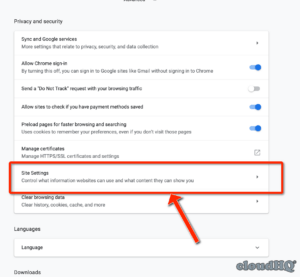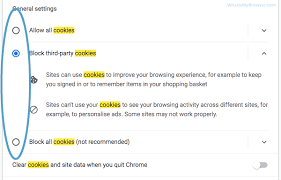How to Enable Third Party Cookies in Chrome
If you are having trouble with login and media player issues on Chrome, you may want to learn how to enable third-party cookies in Chrome. To do so, open the privacy & security section of your browser and select the Preferences option. Select the Custom settings for history and cookies option, and check the box to accept third-party cookies.
In Incognito mode, you can disable third-party cookies on your computer. This will allow websites to save cookies that you find useful, but will block invasive tracking cookies. You may be unsure how to switch this setting in Chrome. If you need help, you should contact your Chromebook administrator Google.

By switching to incognito mode, you will not see your browsing history, and Google Chrome will not save any information that you fill out in forms. Instead, cookies are only stored while you’re browsing and are deleted when you exit Incognito mode. By default, Chrome will deactivate any extensions that are active while incognito. If you’d like to keep these extensions, you can enable them in Chrome’s settings.
Incognito Mode Will Refuse Third-party Cookies:
Third-party cookies are used by other sites to provide you with relevant content based on your location. While these cookies help websites deliver relevant content, they also compromise security. By default, Chrome blocks third-party cookies, but you can enable them in your browser’s settings by checking the box in the address bar.
Google is phasing out third-party cookies in Chrome, but this doesn’t mean the end of tracking. The use of third-party cookies in Chrome will not be completely eliminated, since the need for true end-user consent is still necessary. With this new policy, website owners must look for other ways to deliver personalized ads to their customers and prepare for the cookieless future.
Allowing Third-party Cookies Prevents Login And Media Player Issues:
Google announced in January 2020 that they would phase out third-party cookies from Chrome. In addition to this move, they plan to introduce new browser APIs such as trust tokens to make browsing private and secure. However, this plan is met with resistance from the ad tech community, who worry that a blanket ban on third-party cookies will hurt the Internet economy and start-ups. Regardless, Google is replacing third-party cookies with new technologies that can serve website owners and providers more efficiently and provide precise conversion measurements for advertisers.

Enabling third-party cookies can also help users with login and media player issues. To enable this feature, navigate to the settings menu of Chrome. Select Privacy and security from the left-hand menu. Then, choose Allow site data and cookies from websites. Once this is done, you should no longer experience issues with login and media player.
How Do I Allow 3rd Party Apps On Chrome:
This feature helps websites understand their users’ preferences and understand which content they like. Besides, it keeps cookies from becoming outdated. Moreover, it also enables sites to improve the quality of their content. Some third-party cookies are used by big tech companies, such as Facebook and YouTube. However, this feature can be disabled in some websites.
Third-party cookies also help advertisers target ads. These cookies collect huge amounts of information about the web visitors and send it to the digital advertising industries. In return, advertisers pay these companies for these inferences, which are used to create personalized advertisements.
What Does Enable Third-Party Cookies Mean:
Blocking third-party cookies will not impact your video experience, but it will prevent issues with your video player and login. The YuJa Enterprise Video Platform is compatible with a wide range of browsers and can be used on any device. The YuJa Enterprise Video Platform is an advanced video CMS, which includes tools for recording, live streaming, organizing, and viewing video content. The user interface makes it easy to add videos to your website and search within them using tags.
Tap Site Settings And Then Cookies:
- On your Android device, open the Chrome app.
- At the top right, tap More and then Settings.
- Click on Site Settings and then on Cookies.
- Turn on the settings next to Cookies.
- To enable third-party cookies, check the box next to “Enable third-party cookies”.
YuJa Enterprise Video Platform is a cloud-based video solution that is designed to meet the needs of organizations of all sizes and types. Offers a full range of video features, including digital conferencing, live streaming, and desktop recording. It also offers mobile apps for iOS and Android devices. It also lets users record online content, such as lectures, and offers built-in analytics for effective video management.

Leave a Reply